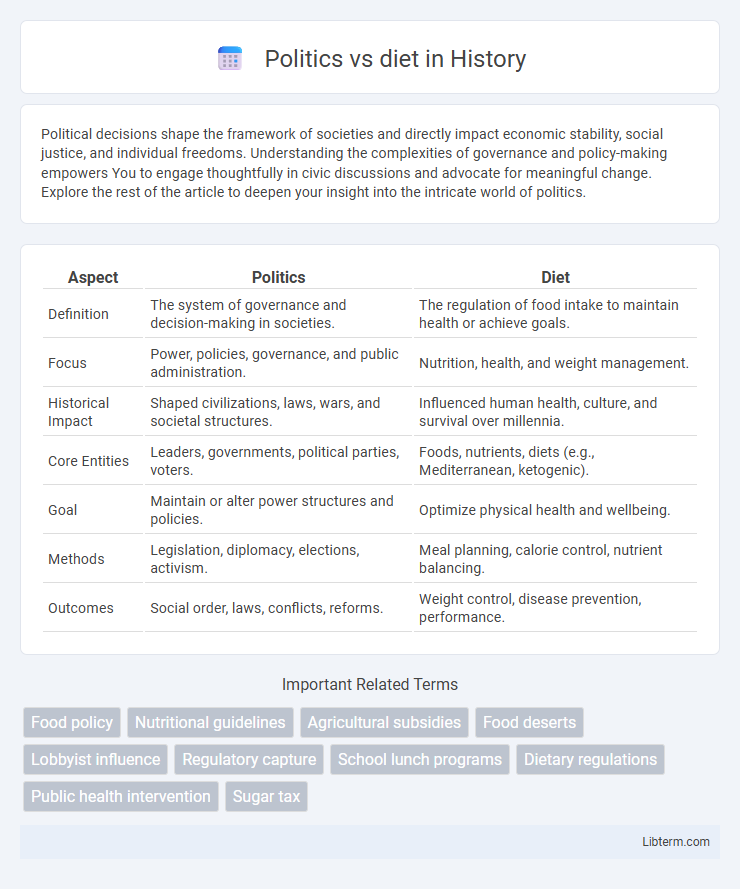Political decisions shape the framework of societies and directly impact economic stability, social justice, and individual freedoms. Understanding the complexities of governance and policy-making empowers You to engage thoughtfully in civic discussions and advocate for meaningful change. Explore the rest of the article to deepen your insight into the intricate world of politics.
Table of Comparison
| Aspect | Politics | Diet |
|---|---|---|
| Definition | The system of governance and decision-making in societies. | The regulation of food intake to maintain health or achieve goals. |
| Focus | Power, policies, governance, and public administration. | Nutrition, health, and weight management. |
| Historical Impact | Shaped civilizations, laws, wars, and societal structures. | Influenced human health, culture, and survival over millennia. |
| Core Entities | Leaders, governments, political parties, voters. | Foods, nutrients, diets (e.g., Mediterranean, ketogenic). |
| Goal | Maintain or alter power structures and policies. | Optimize physical health and wellbeing. |
| Methods | Legislation, diplomacy, elections, activism. | Meal planning, calorie control, nutrient balancing. |
| Outcomes | Social order, laws, conflicts, reforms. | Weight control, disease prevention, performance. |
Introduction: Exploring the Intersection of Politics and Diet
The relationship between politics and diet reveals how government policies influence food systems, nutrition standards, and public health outcomes. Legislative decisions on agriculture subsidies, food labeling, and safety regulations directly affect dietary choices and access to healthy food. Analyzing this intersection highlights the role of political frameworks in shaping population eating behaviors and combating issues like obesity and food insecurity.
Historical Influence of Politics on Dietary Guidelines
Government policies have historically shaped dietary guidelines through agricultural subsidies, wartime rationing, and public health campaigns, reflecting political priorities over nutrition science. The USDA's Dietary Guidelines for Americans often mirror political and economic interests, influencing food production and consumption patterns nationwide. Shifts in political power lead to changes in nutritional advice, demonstrating the strong impact of politics on public diet recommendations.
Government Policies Shaping National Diets
Government policies profoundly influence national diets by regulating food production, labeling, and nutritional standards to promote public health and address diet-related diseases. Subsidies for certain crops, taxation on sugary drinks, and campaigns encouraging balanced nutrition directly shape consumer choices and food availability. These strategic measures aim to reduce obesity, malnutrition, and diet-related chronic conditions, impacting population health outcomes on a broad scale.
Lobbying and the Food Industry’s Political Power
The food industry's extensive lobbying efforts heavily influence political decisions, shaping regulations and policies that impact public health and nutrition standards. Corporations invest millions in campaign contributions and lobbying to weaken nutritional guidelines and maintain favorable market conditions. This political power often results in legislation that prioritizes industry profits over consumer health, hindering meaningful reforms in diet-related public policy.
Political Debates on Nutrition Science
Political debates on nutrition science often center around the regulation of food industries and public health policies aimed at reducing diet-related diseases. These discussions emphasize the influence of lobbying by processed food corporations and the role of scientific evidence in shaping dietary guidelines. Conflicting interests between economic growth and health priorities drive ongoing controversies in legislative decisions surrounding nutrition.
Regulation of Food Labeling and Consumer Choice
Regulation of food labeling plays a crucial role in balancing political interests and consumer choice by ensuring transparency and accuracy in nutritional information. Policymakers implement strict standards to prevent misleading claims, empowering consumers to make informed dietary decisions based on verified data. This regulatory framework aims to protect public health while navigating the complex influence of food industry lobbying and political agendas.
Socioeconomic Impacts of Political Food Policies
Political food policies significantly influence socioeconomic disparities by determining access to nutritious food and shaping public health outcomes. Subsidies for staple crops often lower food prices but may reduce diversity and availability of healthier options, disproportionately affecting low-income communities. Regulatory measures like food labeling and nutrition programs play a crucial role in mitigating diet-related health issues and fostering equity across different socioeconomic groups.
Global Perspectives: Diet Politics Around the World
Global perspectives on diet politics reveal diverse approaches influenced by cultural values, economic interests, and public health priorities. Countries like France emphasize food sovereignty and culinary heritage, while the United States focuses on market-driven dietary guidelines and food industry lobbying. Emerging economies balance nutritional challenges with agricultural policies to address malnutrition and food security amid globalization pressures.
Political Movements Promoting Sustainable Eating
Political movements promoting sustainable eating emphasize policies that reduce environmental impact through plant-based diets, local food sourcing, and reduced meat consumption. Organizations like the Green Party and groups such as Extinction Rebellion advocate for government incentives to support organic farming and food justice initiatives. These movements link sustainable eating with climate action, aiming to transform food systems for ecological resilience and public health.
The Future of Diet Policy: Trends and Predictions
The future of diet policy is increasingly shaped by the intersection of political agendas and public health priorities, with governments worldwide implementing stricter regulations on sugar, salt, and trans fats to combat rising obesity rates. Emerging trends highlight the adoption of plant-based dietary guidelines and sustainable food systems aimed at reducing environmental impact while addressing nutrition-related health disparities. Policy predictions emphasize enhanced collaboration between political institutions, nutrition scientists, and industry stakeholders to develop evidence-based strategies that promote healthier, equitable food environments globally.
Politics Infographic

 libterm.com
libterm.com